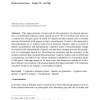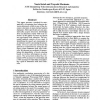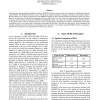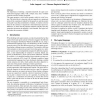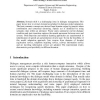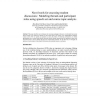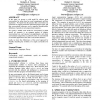102
click to vote
JOLLI
2007
15 years 1 months ago
2007
Abstract This paper presents a framework for the generation of coherent elementary conversational sequences at the speech act level. We will embrace the notion of a cooperative dia...
130
click to vote
ACL
1989
15 years 3 months ago
1989
Existing plan-based theories of speech act interpretation do not account for the conventional aspect of speech acts. We use patterns of linguistic features (e.g. mood, verb form, ...
107
click to vote
COLING
1996
15 years 3 months ago
1996
This paper presents a method for automatically recognizing local cohesion between utterances, which is one of the discourse structures in task-oriented spoken dialogues. More spec...
100
click to vote
LREC
2010
15 years 3 months ago
2010
The paper introduces the Multimodal Russian Corpus (MURCO), which has been created in the framework of the Russian National Corpus (RNC). The MURCO provides the users with the gre...
108
click to vote
CEAS
2008
Springer
15 years 4 months ago
2008
Springer
Human interpersonal face-to-face interaction can be considered in terms of successions of speech acts. These are utterances which contain an intention, and the act of creating an ...
124
click to vote
ICIA
2007
15 years 4 months ago
2007
Although there are high expectations for collaborative discussion and on-line learning, existing systems for on-line discussion and chat facilities are not fully effective in prom...
110
click to vote
ECAI
2006
Springer
15 years 5 months ago
2006
Springer
The importance of defining a standard framework for agent communication languages (ACL) with a simple, clear, and a verifiable semantics has been widely recognized. This paper pro...
131
click to vote
CICLING
2004
Springer
15 years 5 months ago
2004
Springer
Domain shift is a challenging issue in dialogue management. This paper shows how to extract domain knowledge for dialogue model adaptation. The basic semantic concepts are derived ...
125
click to vote
AIED
2007
Springer
15 years 6 months ago
2007
Springer
This paper describes new techniques for assessing pedagogical discourse via threaded discussions that are based on an analysis of speech acts and course topics. The context is an u...
138
click to vote
AOSE
2001
Springer
15 years 6 months ago
2001
Springer
In this paper, we present a social model for software agent conversations for action based on social commitments and their negotiation. We depart from the premises that conversati...
